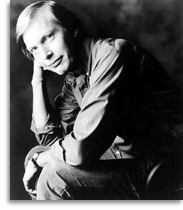
 Bob Edwards, host of National Public Radio's daily newsmagazine Morning
Edition, brought his quick wit and sonorous voice to UB last week for an
hour-long program that touched on his more than two decades at NPR and his deep
appreciation of the radio network's listeners.
Bob Edwards, host of National Public Radio's daily newsmagazine Morning
Edition, brought his quick wit and sonorous voice to UB last week for an
hour-long program that touched on his more than two decades at NPR and his deep
appreciation of the radio network's listeners. "You all don't look a thing like I thought you would," he told the packed audience, which greeted his self-deprecating humor with hearty laughter. "I'm giving you a moment to get over the shock. I've disappointed audiences from Alaska to Florida. It's a face for radio. There's a reason we're in radio."
Edwards was the guest for a Feb. 27 program broadcast live from Allen Hall, where WBFO-FM 88.7 is located. He shared stories about his 23 years with NPR and took questions from the audience. Mark Wozniak, local host of Morning Edition, moderated the program. (Morning Edition can be heard on WBFO weekdays from 6-10 a.m.)
"I had an interesting day yesterday," Edwards said, referring to his interview with Barry Sanders, the only member of Congress who, Edwards said, is neither a member of the Democratic or Republican parties-he's a socialist. "I didn't like his answers and he didn't particularly like my questions," he recalled. And when their conversation had ended, the line between interviewer and interviewee had not been disconnected, and he heard the congressman's next query.
"'Who was that...?' and then he said a word that rhymes with 'glass bowl'," Edwards said. "I guess I must be, because who would dispute the expertise of a member of Congress? That would be like being called ugly by a frog."
His anecdotes were met with enthusiastic laughter, as well as questions about his work. The first question from the audience: What kind of hours does he keep?
"I go to bed at 6:30 or 6:45 if I'm good, and I wake up at 1:30. I could wake up at 1, but it seems so early," he said wryly.
Edwards joined NPR in 1974, its third year. The operation has changed since its salad days, and he admits he's not always enthused about the evolution. When asked whether NPR listeners were going to be hearing more infomercials, Edwards parried, "You mean more 'enhanced programming'? It's the price we've had to pay for getting bigger, for being more ambitious....I don't like it, but what can I say?"
People and corporations have offered money to the publicly funded network, but with strings attached, "and we said 'no'," Edwards said. Exxon, for example, offered $1 million to NPR to do environmental stories, but wanted to dictate what those stories would be. The offer was turned down, he said.
One audience member wanted to know whether anyone has sat down NPR's on-air people and said "this is where you can improve." Edwards laughed, "Obviously not....Thank you for sharing. OK, let me just open up a vein here."
He praised NPR's listeners for their financial support. "You guys saved us," he said, when funding was threatened in 1994 by budget cuts proposed by Congress.